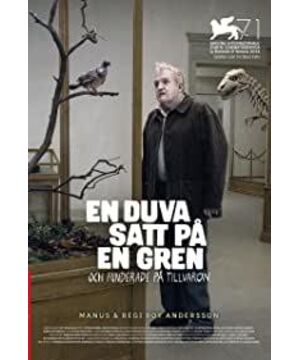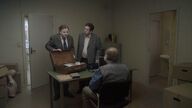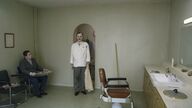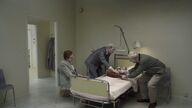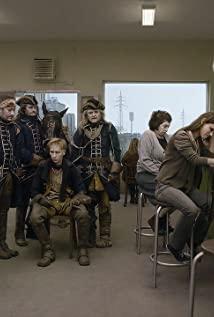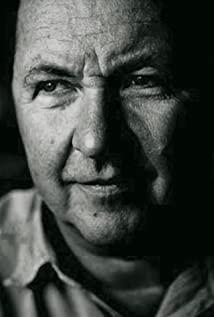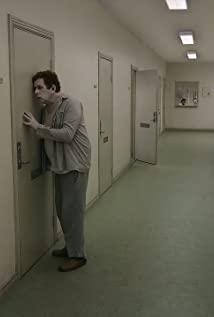If you want to say why you don't like "The Birds of Cold Branches", there are two most intuitive reasons: the non-linear narrative structure is a little confusing; the absurd black humor of European historical themes, as an ordinary audience from other countries, I have a natural sense of cultural barriers, and cannot accurately understand the humor in it.
Fixed camera long shot, staged scene arrangement, group drama, stylized, surreal. These keywords pop up one after another while watching the movie, but in front of these keywords, the unconventionalness of the play is still the most prominent in the film: it is "abnormal". There is no clear structure, no clear beginning and end, no exact location and plot, a shot is a complete segment, the connection between segments is very weak, and when combined into a complete film, they are broken, yes Peaceful, without any progressive conflicts and contradictions. Of course, the script itself does not have standard creation rules, but it is undeniable that without the blessing of all these "unspoken rules" of creation, just looking at the script of this film is pale. As far as the three episodes of meeting the god of death were placed from the very beginning, the difference between the three types of death is just changing the location: home, hospital, restaurant. Pulling relics, talking about meals and other additional abnormal dialogues and action designs only further exaggerates the drama and nihilistic sense of death, creating a "play" environment that makes the audience lose their sense of substitution. There is no conflict, no sense of substitution, how "abnormal" this is for a script, the meaning of its existence is just a tool for the director to complete further visual expression. If there is no Roy Anderson's excellent composition, arrangement and scheduling, etc., just reading such a script would probably be abandoned within ten pages in the hands of most people. I agree that movies should be a kind of art for the masses. The masses love stories and drama conflicts, so a script that the masses do not like, no matter how great it is in terms of art, can’t expel it from being open to the masses at the drama level. fail.
There is a design in the movie. Every time a period of time, a line from a character on the phone will be inserted: "I'm glad to hear that you are fine." When a line is repeatedly mentioned, it is obviously a reminder to emphasize, even in reveal the theme. I've never really liked such a direct arrangement. After emphasizing a certain line, everyone is used to rushing to study the deep meaning of this sentence, which limits thinking in more dimensions to some extent. Although "I'm glad to hear that you're fine" here, in the cold and absurd atmosphere of the movie, it has become a meaningless chatter across the phone like a machine. It doesn't emphasize the line itself, but the state of the human being who utters it - which is what I've found after thinking about it, and the real reason I don't like the movie: its "abnormal" realness embarrassing.
This film should require some viewing thresholds. The closer it is to the deep concept that the film wants to express, the more uncomfortable it is. It's like a collection of short films, the characters are all painted white, the speech and actions are slow, and the scenes are carefully constructed manually. At first glance, it revealed "abnormal". The most impressive abnormal segment is: a group of people enjoy the big drum being roasted by fire, the melodious flute sound comes from the trumpet-like ventilation pipe on the drum, but the source of the flute is another group of people being roasted by the fire in the drum of screams. Cold and cruel, beautiful and scary. Compared with "Hanzhijingjing", the cruel scenes of countless war disaster films are much more "real". They are grand and tragic, even more real than the scenes of news and documentaries. However, the more real and grand the disaster, the greater the sensory stimulation the audience gets, and the farther away the disaster is. When we watch news documentaries, how much real immersion and empathy are left after carefully arranged disaster war films? In short, these so-called true disaster films have pushed audiences into a comfort zone unconsciously. What they bring is not vigilance and reflection, but in many cases, it is just a wonderful performance full of sensory stimulation for the world. However, the abnormal reality of "Cold Branches and Sparrows" actually pulled the audience out of this comfort zone. It conjures up unreal scenarios and makes us watch disasters like a commercial or a play. This kind of absurdity makes me feel more uncomfortable than watching other real disaster movies. Isn't what these abnormal fictional images express exactly our state of mind when we face real disasters? It is not the image that is abnormal, but our own selves radiating from it.
Where is the war, where is the natural disaster, where is the man-made disaster, when it is not really happening around us, do we really still touch our hearts through the screen? So Roy Anderson used such a dramatic method when creating images of disasters. He looked directly at his dark side, narrowed the distance from the disaster, and pulled the audience in his comfort zone with a continuous record—— "Which day is today, it can't be expressed by perception, it has to be recorded continuously... If you can't keep recording, chaos will follow." The chaos of reality is an uncomfortable truth, sober It's crazy sometimes. All of this seems to be the strength of "Hanzhijingjing", but it is precisely because of this that "Hanzhijingjing" is too direct and too sober, I will think it is too exciting, so when I am being pulled out of my comfort zone At that moment, it was doomed that I would not like such a sharp movie.
In fact, the madness of Roy Anderson's performance is consistent with the feeling that the film "Parasite" brought me. It expresses the social problems of the upper and lower classes in an allegorical play structure. But the symbolic characters, the dramatic conflict compressed to the extreme, and the rigorous and rigid structure make me feel like an empty propositional composition. The script was "dancing with shackles" from the very beginning, framing itself a vertical vertical structure and the final theme to be expressed, and then filling in words and colors in the middle. So this script is very exciting, and people all over the world like and accept it easily, but if you look closely, it seems that there is nothing left. It did not leave any blank space for the audience, but printed the standard answer on its own body, and then, like most high-scoring essays, won the Oscar for Best Picture. At the award ceremony, the producer was full of spring breeze and said the award-winning speech. The actor who played the poor family in the play represented by Song Kanghao received flowers and applause brightly. This was a carnival belonging to the upper class. What about the real poor? How can a propositional composition affect reality? Such a sarcastic contrast is like the "abnormal" reality shown in "Hanzhijingjing". The social meaning expressed in the film "Parasite" is limited, but the phenomenon implied by itself is the real social reality. What we should be wary of is not what the film wants to express, but the absurdity of the contrast between the film itself as a commodity and the content of the film.
People are happy to watch the fictional reality and then turn a blind eye to the reality of the reality. This is the comfort zone of the film, a blind spot where it is easy to get lost and confused. To show this phenomenon is to force a person who is used to comfort to be forced to wake up. It is uncomfortable, even disgusting, but it is also necessary.
(Partly borrowed from the main AB movie hall of station b up, invaded and deleted)
View more about A Pigeon Sat on a Branch Reflecting on Existence reviews


